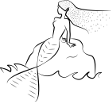;
General info
Date August 6th to August 10th
Place Copenhagen Denmark
Organized by The Department of Biology, University of Copenhagen
Price Free for all PhD students at Danish universities. 200 USD for all other students.
Includes All teaching. Food and accommodation are NOT included in the course fee.
Contact and sign up cphsummercourse@gmail.com
Content
The course is a comprehensive introduction to a number of topics and common research tools used in analyses of genetic data. Topics include: genetic drift, natural selection, population structure, Fst, linkage disequilibrium, relatedness, association mapping, GWAS, genotyping data, next-generation sequencing (NGS) data, 1000 genomes project data. The main focus will be on humans, but the methods are applicable for many other species as well. Lectures will be combined with hands-on computer exercises mostly using R and command line based programs.
Intended Learning Outcome
After the course the student should be able to:
- Use population genetic theory to infer basic population genetics characteristics from genetic data, including Fst, population size, relatedness and linkage disequilibrium
- Be able to infer ancestry and population structure based on genetic data
- Use NGS data including low depth for population genetic inference.
- Select the optimal strategy for disease mapping based on the available data, the trait of interest, and the population genetics characteristics of the sample population, including taking population structure into account
- Interpret and discuss the results of own analyses and results in the scientific literature
Instructors
- Matteo Fumagalli Imperial College London
- Fernando Racimo Natural history museeum Denmark
- Doug Speed Aarhus Institute of Advanced Studies
- Emilia Huerta Sánchez Brown University
- Anders Albrechtsen University of Copenhagen
- Ida Moltke University of Copenhagen
- Benjamin Peter Max Planck, Leipzig
- Line Skotte Statens Serum Institut, Denmark
Time and place
The course will take place from August 6th to August 10th 2018 at Biocenteret, Ole Maaloes Vej 5, 2200 Copenhagen N. All lectures and computer exercises will take place in room 4.0.24 (building 4, ground floor, room number 24). All research talks will take place in room 1.2.03.
Laptop
You should bring a laptop to the course. We will log into a remove server from the laptop so any laptop will do regardless of operating system. However, please, if at all possible, make sure your computer can be connected to wired internet.
Course material
The lecture will be based on a large amount of reading material (articles/notes) that should be read in advance - you can find them here once they are finalized (you will get an email with password). The slides used during the lectures will be made available right before the lectures.
Program
Monday - Introduction to population genetics and NGS data
- 09:00 - 09:10 Welcome
- 09:15 - 10:15 Lecture 1: Introduction to basic population genetic terms and concepts (Fernando Racimo)
- 10:30 - 12:00 Computer exercises I
- 12:00 - 01:00 Lunch (on your own)
- 01:00 - 02:15 Lecture 2: Introduction to basic NGS data, Data processing, and formats (Anders Albrechtsen)
- 02:30 - 03:15 Computer exercises II
- 03:30 - 04:15 Research lecture by Carina Schlebusch, Uppsala University. Title: The genetic history of Africa based on modern and ancient DNA
- 04:30 - 07:00 Reception/social mixer
Tuesday - Analysis of NGS data and population structure
- 09:00 - 10:15 Lecture 3: Estimation of allele frequencies, SNP calling and genotype calling from NGS data (Matteo Fumagalli)
- 10:30 - 12:00 Computer exercises III
- 12:00 - 01:00 Lunch (on your own)
- 01:00 - 02:15 Lecture 4: Inference of population structure (Emilia Huerta-Sánchez)
- 02:30 - 04:00 Computer exercises IV
- 04:15 - 05:00 Research lecture by Emilia Huerta-Sánchez, Brown University. Title: Natural selection and admixture in human populations
Wednesday - Inference of demographic history
- 09:00 - 10:15 Lecture 5: Demographic inference - D/f/F statistics (Ben Peter)
- 10:30 - 12:00 Computer exercises V
- 12:00 - 01:00 Lunch (on your own)
- 01:00 - 02:15 Lecture 6: Admixture graphs and spartial statistics (Ben Peter)
- 02:30 - 04:00 Computer exercises VI
- 04:15 - 05:00 Research lecture by Matteo Fumagalli, Imperial College London. Title: Deep learning in evolutionary genomics
Thursday – Demography and intro to disease mapping
- 09:00 - 10:15 Lecture 7: Demography from site frequency spectra (Emilia Huerta-Sánchez)
- 10:30 - 12:00 Computer exercises VII
- 12:00 - 01:00 Lunch (on your own)
- 01:00 - 02:15 Lecture 8: Association mapping I. Introduction to association mapping (Line Skotte)
- 02:30 - 04:00 Computer exercises VIII
- 04:15 - 05:00 Research lecture by Benjamin Peter, Max Planck, Leipzig. Title: Human migration landscapes
Friday - Advanced disease mapping and detecting selection
- 09:00 - 10:15 Lecture 9: Association mapping II. Advanced association mapping (Doug Speed)
- 10:30 - 12:00 Computer exercises IX
- 12:00 - 01:00 Lunch (on your own)
- 01:00 - 02:15 Lecture 10: Detecting natural selection (Matteo Fumagalli)
- 02:30 - 04:00 Computer exercises X
- 04:15 - 05:00 Research lecture by Tuomas Kilpeläinen. Title: Genetic associations with higher body fat but lower risk of disease
- 05:00 - ? Farewell drinks
Evaluation
Participants who have participated actively in all parts of the course and completed all exercises satisfactorily will be awarded a certificate of completion at the end of the course. The work load corresponds to 5 ECTS points. Note that this workload includes one week of preparation. Reading material for this is available in the above course program.
